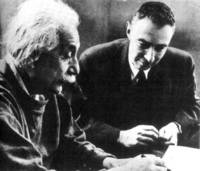As a humanist, Einstein adopted active and open positions on the political and social issues of his time. The authoritarianism and militarism of the German educational system had left a lasting impression on the young Einstein, while the nationalism and the sheer brutality of the First World War cemented his pacifist inclinations.
Notwithstanding his pacifism, Einstein defended the development of an atomic bomb by the United States, with the objective of overcoming Hitler and Nazi Germany. In 1939, after hearing that the Germans were developing a secret project involving Uranium, Einstein wrote a letter to President Roosevelt, suggesting that the Americans should dedicate themselves to nuclear research towards creating a bomb. This resulted in the Manhattan Project, which was directed by Robert Oppenheimer.
Yet one week before his death, Einstein signed his last letter, addressed to Bertrand Russell. In it he agreed that his name be included in a  manifest claiming all nations to renounce to nuclear weapons.
manifest claiming all nations to renounce to nuclear weapons.
 Discuss the decision Einstein made of sending his famous letter to Roosevelt. How can this be reconciled with his firm pacifist beliefs? Discuss how the opinion of important scientists can influence political decisions.
Discuss the decision Einstein made of sending his famous letter to Roosevelt. How can this be reconciled with his firm pacifist beliefs? Discuss how the opinion of important scientists can influence political decisions.

 Robert Oppenheimer
Robert Oppenheimer




 manifest
manifest Robert Oppenheimer
Robert Oppenheimer